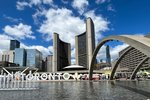Non-Canadian physicians can work in Canada on one of three types of visas:
1. Temporary Foreign Worker Program (commonly referred to as a
“Temporary Visa” or "Temporary Work Permit")
2. Permanent Residency Visa (PR Visa)
3. CUSMA Work Permit (sometimes called by the US term, “TN Visa”)
__
1. Temporary Foreign Worker Program (commonly referred to as a
“Temporary Visa” or "Temporary Work Permit")
The Temporary Foreign Worker Program (TFWP) is the fastest visa; it usually takes two to four months to complete the process; time varies by country, time of year, etc.
The Process:
- The physician receives a job offer from a Canadian employer.
- The employer will have acquired a Labour Market Impact Assessment (LMIA) from the government. The LMIA confirms that there is a need to hire an international physician to fill a particular position.
- After the physician completes the application for licensing in a specific Canadian province, she/he will receive a letter confirming eligibility for licensing in that province.
- The physician undergoes a medical examination by a Canadian-authorized physician in her/his home country.
How to Apply:
In addition to submitting copies of her/his education credentials (e.g., medical degree, board certificates, etc.), the physician submits the following to the Canadian immigration online portal:
- job offer
- LMIA confirmation letter
- education credentials (e.g., medical degree, board certificates, etc.)
- letter of eligibility from provincial licensing body
- immigration medical certificate
Conditions of the Temporary Work Permit:
- The physician’s temporary work permit is tied to his/her employer (i.e., is a “closed” permit) and is valid the duration of the contract or the LMIA.
- The physician can sponsor his/her spouse and unmarried children under age 22.
- The physician’s spouse is eligible for an “open work permit”, i.e., allowing her/him to work with any employer; and the children can attend public schools, including college/university.
- The physician and her/his family can immediately apply for the government-funded provincial health insurance.
- Individuals on temporary work permits cannot vote in federal, provincial, or municipal elections.
- Physicians can apply for permanent residency while in Canada on a temporary visa.
Costs:
- C$155 for the physician
- C$255 for spouse open work permit (processing+holding fee)
- C$85 biometric fee per person (or C$170 if two or more people applying)
- Medical testing (cost varies)
- Background check (cost varies)
2. Permanent Residency Visa (PR Visa)
Prior to relocating to Canada, a physician can apply for a visa as a Permanent Resident from his/her home country. However, the process takes much longer than a temporary work permit (12+ months vs usually two to four months) and is significantly more expensive than a temporary work permit.
The PR system is a point-based system, considering several factors, e.g., age, education, work experience, language skills, job offer, etc. Officially, the Canadian points system is called the “Comprehensive Ranking System” (CRS).
Generally, individuals apply for permanent residency after they are working in Canada on a temporary work permit.
Conditions of the PR Visa:
- With permanent residency, a physician can work anywhere in Canada, i.e., they are not tied to a particular employer.
- The physician’s family (spouse and unmarried children under 22) can apply for PR status at the same time.
- As with those on temporary work permits, the spouse can work anywhere and the children can attend school.
- The physician and her/his family can immediately apply for provincial health insurance.
- Individuals with PR status cannot vote in federal, provincial, or municipal elections.
Costs:
- C$1,525 for physician
- C$1,525 for spouse
- C$260 per dependent child
- C$85 biometric fee per person (or C$170 if two or more people applying)
- Medical testing (cost varies)
- Background check (cost varies)
3. CUSMA Work Permit (sometimes called by the US term, “TN Visa”)
Only American and Mexican physicians working in academic, teaching or research positions are eligible to apply under this visa category. Physicians employed in clinical settings do NOT qualify, and must use either the Temporary Foreign Worker Program (TFWP) or the permanent residency (PR) pathway.
This work permit is suitable for a single person, or a person whose spouse does not work.
Conditions of the CUSMA Work Permit:
- Valid for three years, renewable.
- While the spouse of a physician with a CUSMA Work Permit can enter Canada, she/he cannot work without her/his own work permit.
- Unmarried dependent children under age 22 can attend school in Canada.
- Eligibility for provincial health insurance varies by province (e.g., when eligible and if eligible)
Process:
The process is very fast:
The employer receives an authorization number (“A Number”) from the government, which is given to the physician.
At the port of entry, the physician presents the “A Number”, job offer, proof of qualifications (e.g., degree, transcript copy, license), and passport, and receives the CUSMA Work Permit.
Cost:
- To employer C$230
- To physician C$155
__
Summary
The quickest and most flexible way for physicians to start working in Canada is through the Temporary Foreign Worker Program (TFWP). Physicians who wish to make Canada their permanent home can later apply for permanent residency.
Also see our articles:







